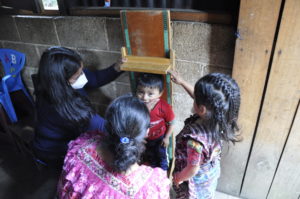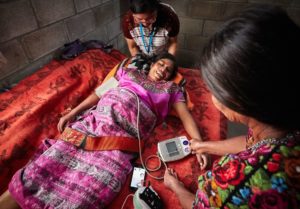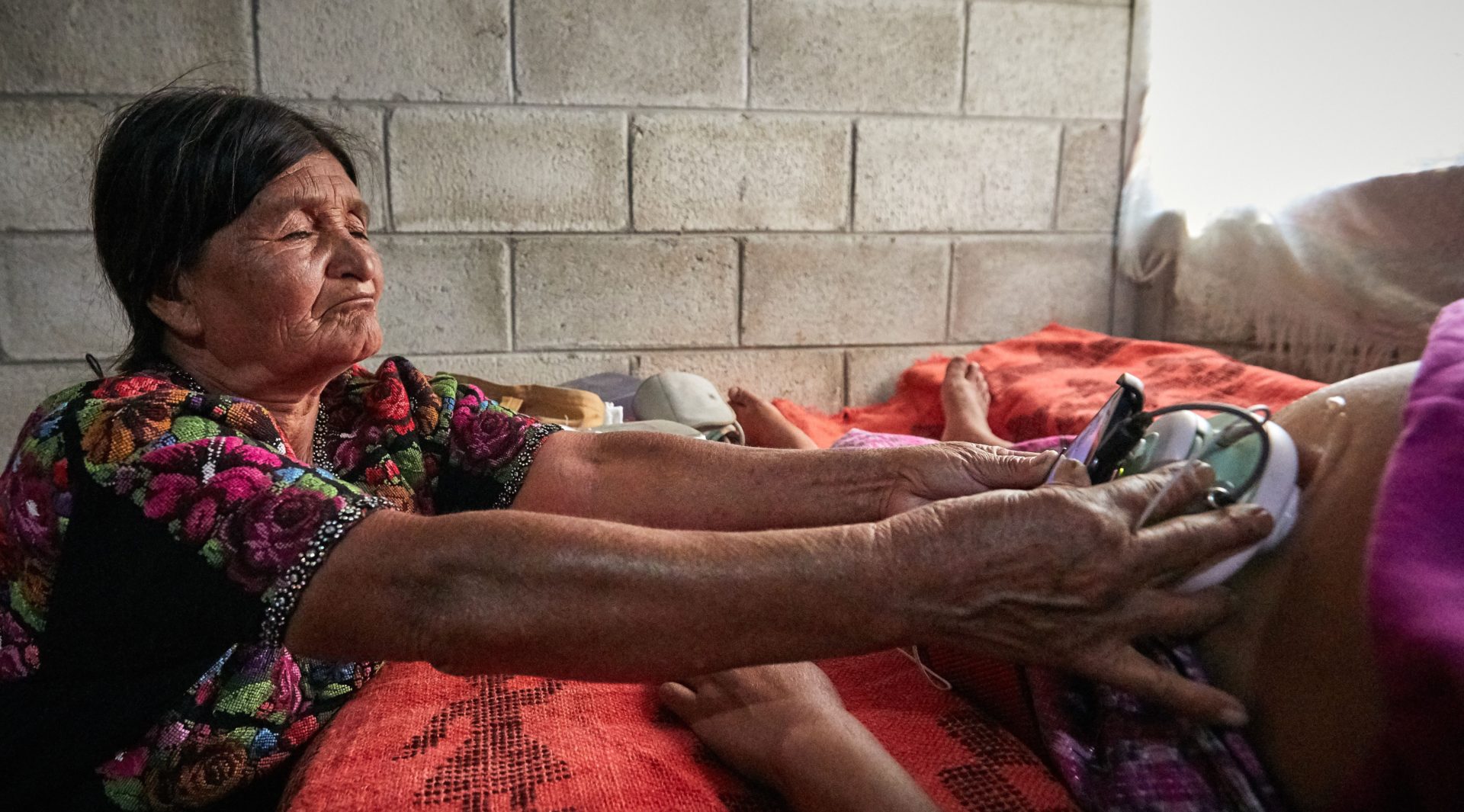Closing health gaps in Mayan communities: Q&A with Wuqu' Kawoq
Written by Olivia Nater | Published: February 14, 2023
Through our Global Partners program, Population Connection supports a growing number of grassroots organizations around the world working to increase access to education, public health and family planning services. Their efforts make a vital difference in their local communities and represent the “final step” in our shared work to make the world a more just and sustainable place for everyone.
Get to know our wonderful partners in this Q&A series! In this blog post, Wuqu’ Kawoq‘s Director of Communications & Development, Jill Hodges, tells us about her organization’s important work to deliver high-quality health care to Guatemala’s Indigenous Maya people. Wuqu’ Kawoq, also known as Maya Health Alliance, formally launched on January 1, 2007 — this day is known as “Wuqu’ Kawoq” on the traditional Mayan calendar and honors medicine and health care providers.
What prompted the founding of the organization?
Community leaders approached our co-founders — two linguists, a medical student, and an anthropologist — who were learning the Mayan language of Kaqchikel in the town of Santiago. They wanted to do something about the lack of decent health care and poor health outcomes in their community and asked if we would work with them to find solutions.

In rural Maya communities, women are twice as likely to die in childbirth as women in Guatemala’s urban areas, 70% of children suffer from malnutrition, and the rate of diabetes is about twice as high as it is in other parts of the country. These gaps reflect the racism and discrimination that Maya people have experienced for centuries and that were amplified in Guatemala’s 36-year civil war from 1960 to 1996.
Initially, we were reluctant to create yet another non-profit in Guatemala. But the problem was urgent and, in conversation with community members, a potential solution emerged. At the core of these health gaps are culture, language, and discrimination.
While 40% of Guatemalans identify as Mayan and speak one of 21 Mayan languages, most health care is delivered in Spanish. So we started with the question: What if Indigenous community health care workers could deliver high-quality care in patients’ own languages, homes, and communities?
What programs or projects are you currently working on?
Fifteen years after our launch, we continue to focus on achieving health equity with highly trained community health workers dedicated to providing the most effective care possible.
We care for more than 10,000 patients and make some 35,000 visits annually to homes, clinics, and community centers in Guatemala’s Central Highlands. Our program areas include women’s health (reproductive health, family planning, and cancer screening), maternal health, early childhood development and nutrition, diabetes and other chronic diseases, and care for children with complicated conditions that would otherwise go untreated.
An important part of this work is offering ongoing training to ensure that knowledge and skills are passed on so this work can continue and grow in Guatemala’s most vulnerable communities. Another key is focusing on implementation science, or finding the best way to get practices that we know are effective working in the context of the communities that need them most.
What do you hope to achieve in the next five years?
We are excited to be expanding our sexual and reproductive health and family planning services to include more male partners. We recently added a male peer educator to help invite men into the conversation, and one of his first workshops was for a group of police officers. We’re also expanding the topics we cover to include important aspects like the stages of development and healthy relationships.
Another area of growing emphasis for us is working for policy changes to address the root causes of health problems. A key focus of these efforts will be on awareness and action around improving the health of the planet, beginning with heightening understanding around how climate health and human health are intertwined.
We’re launching an Institute for Health Education, Leadership, and Equity to share what we’ve learned, learn from others, and help address Guatemala’s significant health worker shortage, particularly in rural areas. The Institute will train the next generation of Guatemalan health providers, with a focus on women and Indigenous people.
What have been some of the greatest challenges you have faced?

One of the biggest challenges in recent years has been responding to the growing hunger and poverty that has resulted from Covid combined with climate events like hurricanes, floods, and droughts, and then 2022’s global economic crises. We are seeing more children on the brink of life-threatening, acute malnutrition. With public health services still staggered from Covid, we also are helping more people who are not able to find the treatment and medications they need, including family planning methods — the public health system has been out of stock of some methods since last July.
Another challenge over time has been making sure that we are truly listening and responding to community members, not just the most vocal or connected members, but those who are in the best position to help identify their communities’ most pressing needs and develop practical solutions. This means continually monitoring our effectiveness and impact with community input and resisting the draw to new programs and funding that do not make sense for the communities.
What are you most proud of?
We are achieving what we set out to accomplish: delivering practical, sustainable, quality, community-based care that is closing health gaps that disproportionately affect Indigenous Maya people. In the communities where our programs operate, rates of child malnutrition have dropped 20-40%. Annual maternal deaths from childbirth have dropped from eight to zero per 800 births. Cervical cancer is being detected earlier and treated more effectively, and more women and men have access to family planning information and resources. That said, there’s still plenty of work to be done!
We’re extremely proud of our amazing team. We’ve been fortunate to attract an exceptionally talented staff who are passionate about our mission. Our team is 94% Guatemalan, 90% women, and 84% Maya.
Thanks to our Research team, we’ve built a robust data collection, research, and evaluation practice that informs everything we do. This helps ensure that we are providing the most effective care possible and also allows us to develop and share innovative approaches to care in rural health settings.
Anything else you’d like to share with Population Connection members?

Most Indigenous women in rural Guatemala choose to give birth at home with traditional midwives because they fear discrimination and mistreatment in public hospitals. As a result, when problems arise requiring advanced medical treatments, they get care too late, if at all. To better connect Indigenous mothers with help when they need it, Wuqu’ Kawoq developed a Mobile Maternal Health program in collaboration with a team from Emory University. The program equips midwives with a checklist-based smartphone application and low-cost tools to detect high-risk problems. When problems come up, the app immediately alerts Wuqu’ Kawoq medical staff, who consult on the cases. When mothers require hospital care, Wuqu’ Kawoq’s Maya care navigators accompany mothers and serve as advocates and translators throughout their hospital stays.
Since the program began in 2017, only two maternal deaths have been recorded in the more than 4,000 births attended by participating midwives. Previously the rate was about eight deaths a year. The program’s success relies on both the innovative use of technology and on trusted relationships among mothers, midwives, and navigators.
At the time of her fourth pregnancy at age 31, Doña María, a field worker from a village outside the city of Tecpán, was living in fear of her husband. Several years earlier, out of safety concerns, she had placed her first child from a previous relationship in the care of relatives.
Because María had a cesarean delivery with her last child just over a year earlier, workers at the local health post advised her to seek medical care to address potential risks. She was reluctant to do so, fearing that it would provoke her husband, who did not like it when she left home. This changed when she connected with Wuqu’ Kawoq through her midwife. Working with the midwife, Wuqu’ Kawoq care navigators reached out repeatedly until Doña María’s husband agreed to allow her to receive their calls and, ultimately, to see a doctor and schedule a cesarean delivery.
Unfortunately, Maria went into labor well before her scheduled delivery. Thanks to her earlier experiences, she understood that it was important to get help regardless of how her husband might respond. But this time, when her doctor suggested that she be admitted for treatment of an infection, her husband said he supported the treatment and agreed to care for the children at home while she was gone. With relief, she agreed to the treatment.
Three weeks later, Doña María returned to the hospital to give birth by cesarean delivery to a 6-pound 4-ounce boy. Today, she is enormously grateful for her healthy new son and for the support and care she now receives from her husband. She credits her work with the Wuqu’ Kawoq team for teaching her the value of her own life.
To learn more about Wuqu’ Kawoq, visit their website and follow them on Facebook and Instagram!

